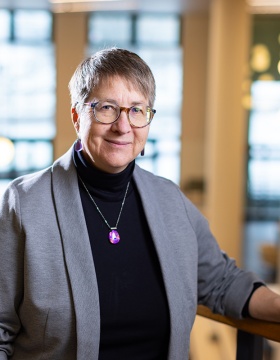Forthcoming book explores how adult learners’ writing suggests a need for more age-inclusive higher-ed practices

Release Date: February 18, 2025
BUFFALO, N.Y. – Adult learners in colleges and universities nationally comprise about a quarter of all undergraduate students. Although that figure fluctuates in relation to the overall economy and varies further depending upon how a non-traditional student is defined, the size of that group remains significant regardless of how it’s measured.
Yet there hasn’t been a lot of research dedicated to this large segment of the country’s post-secondary population, according to a University at Buffalo researcher whose forthcoming book exploring the writing lives of students is now providing a much-needed look into the value they bring to an age-integrated classroom.
“Insiders, Outliers: Centering Adult Student Writers at an HBCU” (Rutgers University Press) by Collie Fulford, PhD, an associate professor of English in the UB College of Arts and Sciences, is an idea that grew out of her teaching. The book offers new conceptual models of writing that demonstrate how the practice of composing functions as a complex form of agency.
“Being in the classroom at North Carolina Central University (NCCU), where I previously taught, alerted me to the richness of the adult students’ lives and how their out-of-school experiences informed our class,” says Fulford, who also serves as director of the Academic and Professional Writing Program at UB.
“Their writing experiences suggested to me that I had a lot to learn.”
But time was limited. And class time didn’t afford what Fulford wanted to accomplish. Given her heavy teaching load at this broad access university, only research could slow things down in ways that allowed for deeper questions. She details two separate studies in the book that speak to a critical need for more age-inclusive practices in higher education.
The first study, with 200 participants, consisted of surveys, focus groups and interviews that explored the reasons students left school and later returned.
But Fulford knew there was more.
An expert in rhetoric and composition with her own experiences as a non-traditional student, she wanted to know about the writing lives of adult learners to follow what came out of that initial study.
For the second study, like the first, Fulford again turned to student partners.
“To me it was a situation of cultural distance that didn’t feel ethically right for me to be peering in and asking people about their lives,” says Fulford. “I brought in two adult undergraduate learners for the second study who helped craft the questions and conducted initial interviewing for this part of the research.”
The exclusively interview-based second study included 30 participants from two groups: undergraduates 25 and older and graduate students 30 and older.
“I think certain subsets of the university turn to adult students for marketing purposes,” Fulford says. “But the same institutions aren’t necessarily adapting their services in ways that reflect the broad population of students they’re educating.”
Orientation practices were a common theme for adult learners, who often found the sessions pitched as if all newcomers were 18 and coming to college directly from a traditional K-12 education.
“A practice intended as a welcoming experience turns out to be alienating,” says Fulford. “The adults who brought up this issue felt orientation was intended for younger students and turned out to be a costly experience for people who lost time from work to attend.”
Fulford says it’s time to understand what adult learners are bringing to the university.
“As a writing scholar and teacher, learning about the complexity and sophistication of the rhetorical situations that these students have found themselves in and have to respond to inside and outside of the university really made me think about the wisdom we have to tap,” she says. “When we acknowledge the breadth of experience these students have it further contributes to our ability to teach to the full spectrum of learners in the classroom.”
The experience has made her a better teacher.
“I understand writing practices and know how to teach them well to different kinds of students, but I was blown away listening to the instances when students were composing out of a need — a deep, profound personal need to make change — to address sexism, racism and ageism, and the resources they drew upon to intervene through writing.
“These are things I didn’t learn as a scholar of writing or from the research literature that already exists, which often positions adult learners as ‘at risk’ or burdened by competing life responsibilities. I learned it from directly listening to students and hearing what matters to them and how they used their writing to express that.”
Fulford says she has stayed in touch with many of these students, including publishing and presenting together about the issues raised in the studies. She has also been inspired to try different interpretive and writing practices because of the diversity of adult students’ ways of thinking.
The book is a first step. Fulford says the door is now open and more researchers need to engage with this population of students, both in higher education and writing scholarship.
“We should all get excited about the opportunity to work with them,” she says.
Media Contact Information
Bert Gambini
News Content Manager
Humanities, Economics, Social Sciences, Social Work, Libraries
Tel: 716-645-5334
gambini@buffalo.edu
